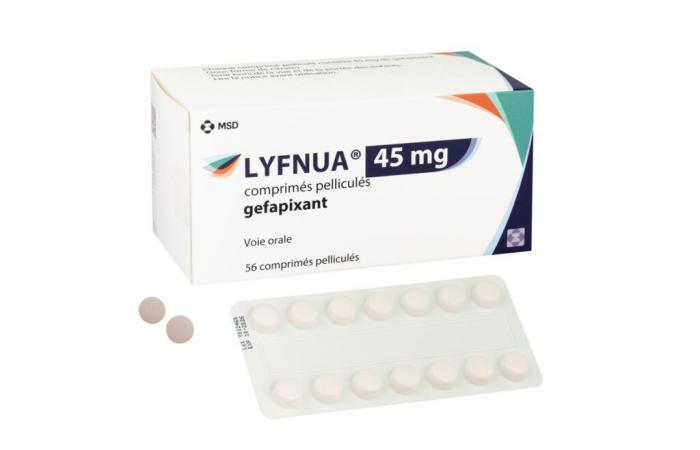Indications
Lyfnua is indicated in adults for the treatment of refractory or unexplained chronic cough.
Mode d’action
Gefapixant is a selective antagonist of P2X3 receptors, which are adenosine triphosphate (ATP)-sensitive ion channels present on the sensory C fibers of the airway vagus nerve. In response to inflammation or irritation of the airways, cells in the respiratory lining release high levels of ATP. This binds to P2X3 receptors and this connection is perceived as a signal of injury by the nerve fibers, triggering the cough reflex. By blocking P2X3 receptors and therefore ATP signaling, gefapixant reduces exaggerated sensory nerve activation and excessive coughing.
Dosage
The recommended dose is 1 tablet 2 times a day, to be taken with or without food without dividing, crushing or chewing it.
Tell the patient
Do not take a missed dose and continue treatment at the usual pace without doubling the next dose.
Contraindications
Hypersensitivity to any of the components. Gefapixant contains a sulfonamide moiety, and cross-hypersensitivity with sulfa hypersensitivity cannot be excluded.
Pregnancy and breastfeeding
As a precaution, avoid use of Lyfnua during pregnancy and in women of childbearing potential who are not using contraception.
Discontinue treatment or breastfeeding, depending on the benefits for mother and child.
Adverse effects
Taste disorders (dysgeusia, ageusia and hypogeusia) of mild to moderate intensity are very often reported. They generally disappear shortly after stopping treatment but can, in some patients, persist for more than 1 year.
Upper respiratory infections, decreased appetite, dizziness, cough, oropharyngeal pain, insomnia, and digestive disturbances are also common.
Drug interactions
No clinically significant interactions were identified.
Deliverance
List I.
Medicine subject to initial prescription reserved for specialists in pulmonology or otorhinolaryngology.
Unrestricted renewal.
Technical sheet
Gefapixant 45 mg for one pink, round film-coated tablet, box of 56, PFHT: €97.18, AMM: 34009 302 930 7 2.
MSD : 01 80 46 40 00
Chronic refractory or unexplained cough
Coughing is a defense reflex used to evacuate and purify bronchial secretions. It is a symptom that requires diagnostic research.
What is refractory or unexplained chronic cough (Tocri)?
Depending on the duration of the cough, it can be acute (less than 3 weeks), subacute (3 to 8 weeks) or chronic when it lasts more than 8 weeks. Chronic cough is most often due to upper airway cough syndrome (rhinitis, allergic rhinitis, sinusitis, etc.), asthma, gastroesophageal reflux, medications such as blood pressure inhibitors. converting enzyme or even smoking. We speak of refractory chronic cough when the cough does not improve despite the identification of one or more causes and appropriate management, and of unexplained chronic cough when no cause is found. A Tocri can be responsible for dysphonia, vomiting, sleep problems, fatigue, or even stress incontinence. Tocri is at least in part triggered by activation of sensory C fibers of the airway vagus nerve when adenosine triphosphate (ATP) binds to P2X3 receptors.
How is it characterized?
The Tocri can be linked to an excess sensitivity of the receptors for little or no cough-producing stimuli such as singing, speaking, laughing, deep breathing, a change in temperature, an odor, physical activity, etc. When the Tocri s stops during sleep and tends to increase in the presence of others, it is considered psychogenic, which mainly concerns women of postmenopausal age and can occur in a psychiatric context.
By Delphine Guilloux






